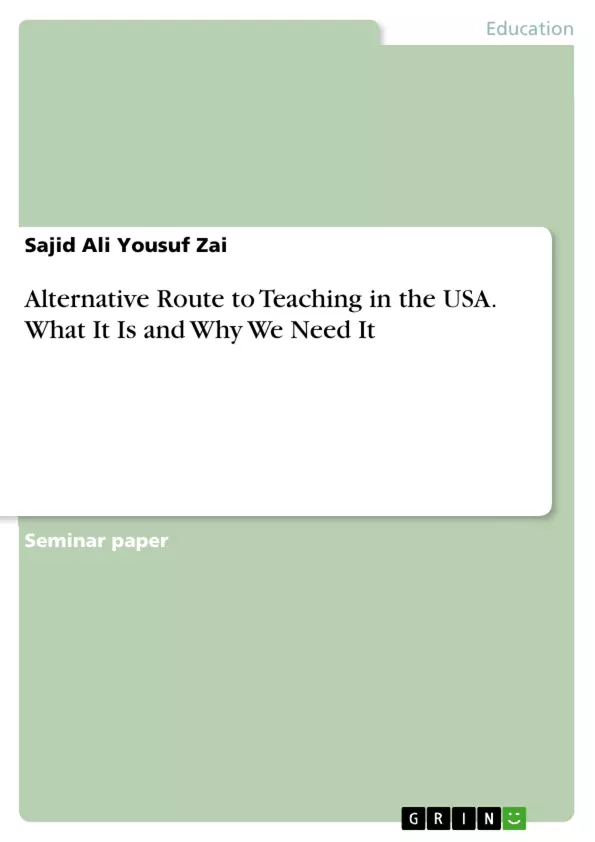This brief is going to discuss the importance of licensing teachers, the policy background and what alternative teaching certification is. This brief will then discuss the rationale of using alternative teaching certification. The objective of this brief is to continue to support that traditional programs as it is good strategy in preparing trained teachers and in meanwhile encouraging alternative programs to develop. This brief also gives empirical evidence on that we need both traditional programs and alternative programs. At the end, this brief will provide some suggestions for policy makers.
Inhaltsverzeichnis (Table of Contents)
- Objective of the brief
- What is licensing teachers?
- Policy background
- What is Alternative Teaching Certificate (ATC)?
- Theoretical Rationale
- Empirical evidence
- Practical Plan
- Conclusion
Zielsetzung und Themenschwerpunkte (Objectives and Key Themes)
This brief examines the importance of licensing teachers, exploring alternative teaching certification as a means to address teacher shortages and enhance educational quality. The brief analyzes the rationale behind alternative certification programs, provides empirical evidence on their effectiveness, and offers suggestions for policymakers.
- The role of teacher licensing and its impact on educational quality
- The rationale and implementation of alternative teaching certification programs
- The effectiveness of alternative certification programs in comparison to traditional teacher preparation
- Policy implications and recommendations for improving teacher recruitment and development
- The potential benefits and challenges of incorporating alternative routes to teaching
Zusammenfassung der Kapitel (Chapter Summaries)
- Objective of the brief: This section introduces the purpose and scope of the brief, focusing on the importance of teacher licensing and exploring the rationale for alternative teaching certification programs.
- What is licensing teachers?: This chapter defines the traditional process of teacher certification, highlighting the role of state authorities in ensuring teachers meet specific requirements. It emphasizes the importance of licensing teachers in ensuring their content knowledge and pedagogical skills.
- Policy background: This section examines the policy context surrounding teacher certification, particularly in light of the need for highly qualified teachers to improve student performance. It explores the emergence of alternative routes to teaching as a response to teacher shortages and concerns about the effectiveness of traditional programs.
- What is Alternative Teaching Certificate (ATC)?: This chapter defines alternative teaching certification programs, contrasting them with the traditional path of teacher education. It highlights the recruitment of individuals without prior education degrees and the subsequent training they receive to become practitioner teachers.
- Theoretical Rationale: This section delves into the theoretical arguments supporting alternative certification. It explores the limitations of traditional certification requirements and the potential benefits of recruiting subject matter experts without formal education degrees.
- Empirical evidence: This chapter presents research findings on the effectiveness of alternative teaching certification programs, focusing on studies that have compared the impact of alternative teachers with traditional teachers on student achievement.
- Practical Plan: This section offers practical recommendations for policymakers, schools, and institutions involved in teacher preparation. It suggests strategies for balancing traditional certification programs with alternative routes to teaching and for tailoring teacher preparation programs to meet the specific needs of schools and students.
Schlüsselwörter (Keywords)
The central themes of this brief revolve around teacher licensing, alternative teaching certification, teacher quality, student achievement, and policy recommendations for improving teacher recruitment and preparation. The brief explores the effectiveness of different routes to teaching, examining the evidence on alternative certification programs such as Teach for America (TFA), and highlighting the need for a balanced approach that considers both traditional and alternative routes.
Frequently Asked Questions
What is the main objective of this brief regarding teacher licensing?
The brief examines the importance of licensing teachers and explores alternative teaching certification as a strategy to address teacher shortages while maintaining educational quality.
What is an Alternative Teaching Certificate (ATC)?
An ATC is a non-traditional path to teacher certification that recruits individuals without prior education degrees, providing them with training to become practitioner teachers.
Why is teacher licensing considered important?
Licensing ensures that teachers meet specific state requirements, verifying their content knowledge and pedagogical skills necessary for student success.
What theoretical rationale supports alternative certification?
The rationale includes the potential benefits of recruiting subject matter experts who may lack formal education degrees but possess deep knowledge in specific fields.
What empirical evidence is discussed in the brief?
The brief presents research comparing the effectiveness of alternative teachers, such as those from Teach for America (TFA), with traditionally prepared teachers regarding student achievement.
What are the policy recommendations for teacher recruitment?
It suggests balancing traditional and alternative programs and tailoring preparation to the specific needs of schools and students.
- Quote paper
- Sajid Ali Yousuf Zai (Author), 2015, Alternative Route to Teaching in the USA. What It Is and Why We Need It, Munich, GRIN Verlag, https://www.hausarbeiten.de/document/312609


